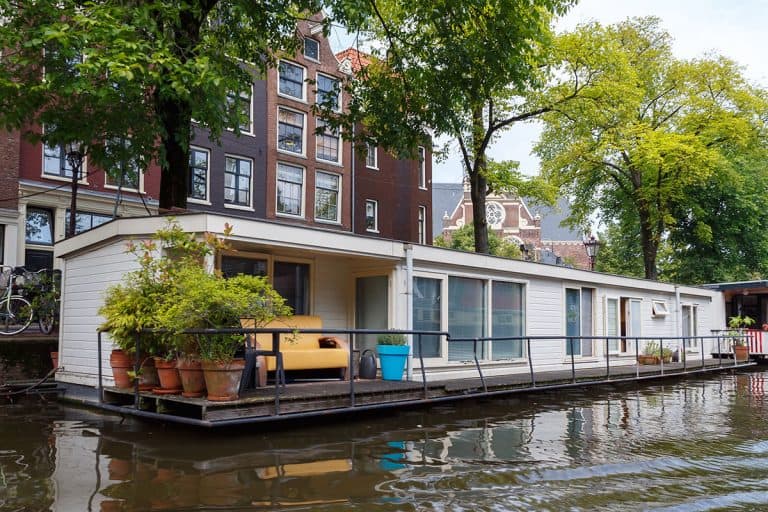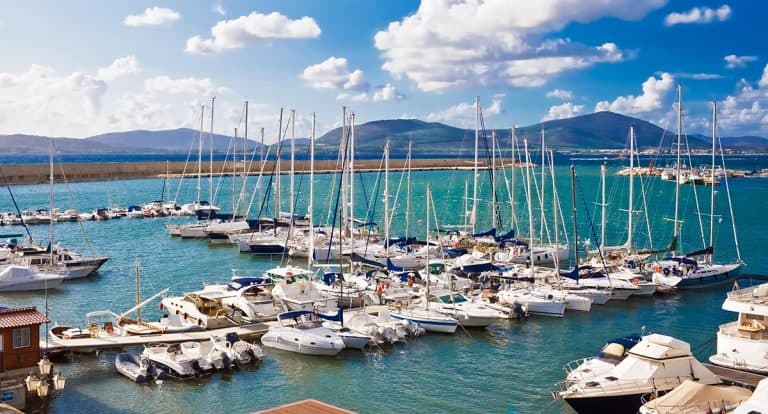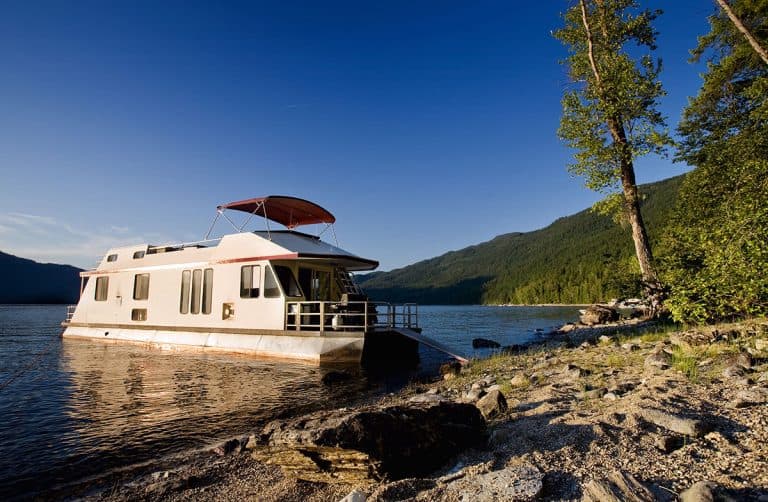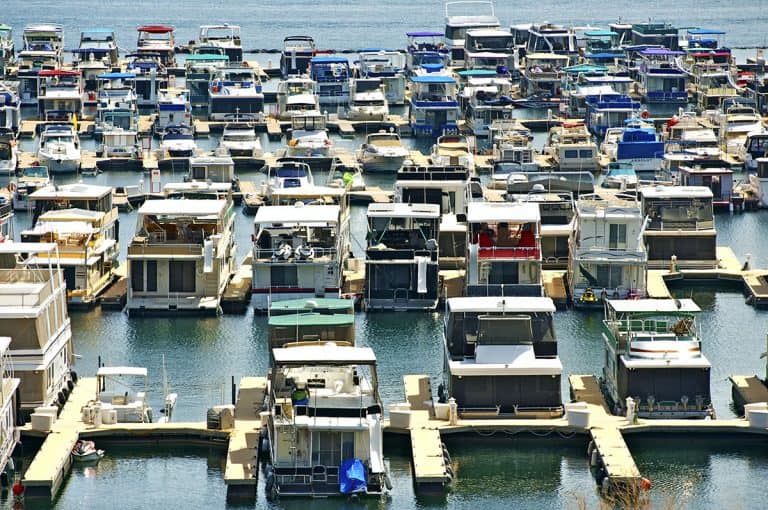Pros and Cons of Living on the Water – Is Houseboat Life for You?
Is living on a houseboat for you? That is the question many people are asking themselves. If you are looking to live on the water, but prefer more space than a typical boat or yacht can offer, and are content staying in the marina most of the time, then perhaps living in a houseboat is for you.
But this is not a decision to be taken lightly. Houseboats come with many pros and cons that need to be carefully considered before making such an important decision.
Pros of Living on a Houseboat
Let’s start with the upsides of houseboats. There are many 🙂
It’s Affordable
Living on the water can be a cost-effective way to live and often much more affordable than renting or buying land and building your own house. Although houseboats do cost more than many other alternative types of housing, they are generally more affordable than an ordinary house. While the cost of houseboats can reach into the millions, a houseboat in good shape can be bought for a few hundred thousand dollars.
This price level makes houseboats particularly appealing to those who wish to live in a location with high property prices. Many people have found that buying a houseboat allows them to live in large cities located by the ocean or rivers that would otherwise be prohibitively expensive. Often they can buy a houseboat and place it in a marina for a fraction of the cost of a much smaller apartment.
Another significant upside to houseboats is that you will probably pay no property tax. This is due to the fact that technically speaking, houseboats are typically not considered real estate. Depending on where your houseboat is registered, you may have to pay an annual license fee, but it is likely to be much smaller than the corresponding property taxes on real estate of a similar size and location.
You Can Enjoy a Relaxing Environment
Most houseboat communities are very peaceful and quiet. The water around the boats is usually still, meaning that it can be very serene and pleasant to live in such an environment. In addition to the peace, you will get fresh air and a clean environment while observing wildlife such as ducks, seagulls, and perhaps even dolphins on a regular basis from your porch.
Another benefit of living on the water is that there will be a place to swim nearby. Maybe even from your own terrace or at least in a nearby cove or a marina pool. And if you like fishing, you will be able to do it from your own home or at least very nearby. Who doesn’t like having freshly caught cod for dinner?
They are Easy to Move
Say you get tired of living in the same place, or you get a new job far from your current location. If you live in a house or a condo you would first have to sell your home, then find a new place, then move your belongings. If you live on the water, it would be much easier to just pick up and go without much hassle.
Moving wouldn’t necessarily be cheap as most houseboats need a towboat (or a truck if over land), but it would be a lot easier and much quicker than trying to sell a home and move all your furniture.
If you plan on moving relatively often, it may be worth it to look into converted trawlers that can move under its own power. They are are less like a traditional house in terms of available space and design, but they will let you move with ease.
Houseboats Are Eco-Friendly
Houseboats are eco-friendly because they don’t use up as much energy as traditional houses do. This is mainly because they tend to be smaller and require less energy to heat in the winter. Most Marinas also have few trees and buildings blocking the sun, which means the sun heats your home more easily and you can set up solar panels.
Marinas by the sea are also more windy, meaning you can set up a wind generator to generate free and sustainable electricity. Small wind generators for boats typically have a max power output of 350W to 600W.
Houseboats Come With Modern Amenities
Unlike many other types of alternative and affordable homes, houseboats are equipped from the factory with kitchens, bathrooms, bedrooms, living rooms, etc. This offers a lot of conveniences for those looking for an affordable yet comfortable way to live.
Lots of Opportunities for Socialization
Marinas are a great place to meet people and make friends. You will get to know other houseboat owners with similar interests and values, and you will meet boaters and sailors who have tons of stories to tell about their journeys.
And when you feel the need to be by yourself, you can retire to your private home. This is one frugal lifestyle that doesn’t require roommates or shared bathrooms – unless that’s what you prefer.
The Gentle Rocking
You’ll feel the gentle rocking of your houseboat, and you can hear the water lapping against the hull. This has a very calming effect on many people, especially in the afternoon. Your kids will love the gentle rocking, too, as it is similar to being rocked in a cradle or parent’s arms. They might sleep soundly for hours at a time while you catch up on your reading or get some work done.
In my experience, there is really no downside to this. But if you do find it disturbing, you will probably have to look for a different type of home as no houseboat is perfect.
Cons to Living on a Houseboat
While there are lots of upsides to this lifestyle, there are also some downsides that come with houseboat living.
Limited Space
Houseboats tend to be relatively small. A typical houseboat has about 500 to 1,000 square feet of floor space which is not tiny but still much less than half the size of an average house.
The space limitations mean that you will have to be picky with what furniture you want, and space-consuming hobbies and businesses are usually off the table.
No Land
You can’t grow much food on a houseboat or keep any livestock. If self-sufficiency is part of your dream life, a houseboat may not be for you. While you can catch a lot of fish and generate your own power, that is more or less your only opportunity for self-sufficiency. To some that is great, while others dream of becoming more self-sufficient.
You May Have to Rent Your Slip
If fully owning your own place is important to you, this can be difficult in a houseboat. In many marinas, you are only able to rent the slip rather than buying it. This means you will continue to pay rent at long as you stay there, whereas a private slip or land that is bought outright can save you a significant amount of money long-term.
Another challenge with renting is that your contract can be canceled by the marina, forcing you to move your houseboat to a new location. This is relatively uncommon but it does happen.
If owning your slip is important so you, look for marinas where owning is a possibility. Note that prices can vary from just a few thousand dollars to hundreds of thousands in very popular locations.
Depreciating Value
Unlike most houses, houseboats lose value over time. Not as fast as cars do, and they last much, much longer. But you are very unlikely to be able to sell it for more than you paid. This is another reason why buying your slip may be a good investment as you will have some real estate that may be worth more in the future, provided it’s in a location that becomes more popular over time.
Besides depreciating, houseboats can also be difficult to sell if you want to move, as there is a finite number of people who want them. You may have to wait a while for the right buyer who is willing to pay what you think it’s worth.
You Have to Live Near Water
While living by the water is amazing, this can be a significant downside if you want to be near family who live inland or if you work inland. Far most land is nowhere near water and thus many businesses are located far from any marina.
Therefore it’s important to consider your short and long-term plans and opportunities before you buy a houseboat.
Potentially Less Freedom
As you are likely to be staying in a marina, you will be subject to the rules of the marina. Those rules may be very lax or very strict depending on who owns the marina and how it is managed. This may not be ideal for people who want to live on their own terms.
If you are staying at a houseboat community with an HOA-type arrangement, you will have more opportunity to influence the regulations and perhaps help guide the development of the community.
Of course that all depend on where you are staying, and remember that you can move your home to another marina if you are starting to feel too restricted.






Father & brothers had houseboats .